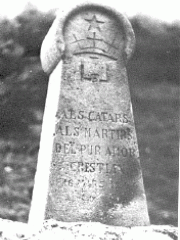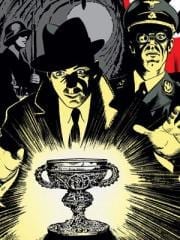Antonio Gadal
Отто Ран и сокровища альбигойцев
В Третьем рейхе был еще один человек, который выбрал целью своей жизни поиски Святого Грааля. Однако если для Гитлера священная чаша оставалась мистическим символом, этот исторический персонаж подошел к теме как прагматик - он был убежден, что Грааль существует на самом деле и его вполне можно отыскать и потрогать руками. Речь идет об Отто Ране, историке-самоучке и "черном" археологе. Он утверждал, что Святой Грааль необходимо искать среди сокровищ альбигойцев. АЛЬБИГОЙЦЫ (лат. albigenses) - еретическая секта, ветвь секты катаров. Существовала в Южной Франции (провинция Лангедок). Свое название получила от области Альбижуа. Впервые термин "альбигойцы" появился в 1181 году.
Otto Rahn (Dutch)
Otto Rahn werd geboren in Michelstadt (Odenwald) op 18 februari 1904. Na zijn middelbare studies (en de eerste wereldoorlog) trekt hij naar de universiteit waar hij aanvankelijk rechten studeert. Maar al spoedig gaat zijn belangstelling uit naar de literatuur en laat hij zich inschrijven aan de faculteit der letteren in Heidelberg. Zijn droom is literair recensent te worden voor een krant of tijdschrift.
Als muziekliefhebber dweept hij met Wagner. Diens "Parsifal" brengt hem in contact met de graallegenden en hun Duitse auteur Wolfram von Eschenbach. Die studie zal hem nooit meer loslaten.
Otto Rahn Biography
CHRONOLOGY 1904-1939
18 Feb 1904 Otto Rahn born, Michelstadt. Parents Karl & Clara (nee Hamburger)
1910-1916 Junior school at Bigen
1916-21 Secondary school at GrieBen
1922 obtains Baccalaureat
1924 obtains Bachelor in Philology and History
1930 Rahn begins his European travels (Paris, Provence, Switzerland,
Catalonia, Italy)
1931 Rahn visits French Pyrenees. Visits "Spion" in Pyrenees with Himmler and Abetz
1932 Rahn leads a Polaires expedition in Pyrenees
13.12.33 Rahn joins the German Writers Association
1934 publishes "Kreuzzug gegen Gral" (Crusade against the Grail)
1935 appointed to personal staff of Heinrich Himmler
29.2.36 Rahn joins Allgemeine-SS, member 276 208
1936 Rahn visits Iceland with 20 men
1937 publishes "Luzifers Hofgesind. Eine Reise zu denguten Gelstern Europa" (Lucifer's Court in Europe; Rahn sent back to Languedoc (Montsegur), says he will return in 1939. Time of alleged Corbieres visit?
20.4.37 promoted to sub-lieutenant (Untersturmfuhrer)
Sep-Dec1937 military service for "disciplinary reasons" at Oberbayern Regiment, Dachau<
Holy Grail
Since the publication of The Da Vinci Code the debate rages as to what and where the true Holy Grail exists
Taken as a whole, the various renditions of the Holy Grail legend, whether they derive from Europe or Asia, imply that there are many forms that the Holy Grail can take.
These legends assert that the Holy Grail can be anything from the platter mentioned by Chrétien de Troyes, the first author of the Holy Grail legend, to the Cup of Christ alluded to by Robert de Boron, or even the Stone of Heaven mentioned by Wolfram von Eschenbach in Parzival.
Raiders of the Lost Grail
Berlin between the wars was a city known throughout Europe for its bohemian subculture of young intellectuals. Amongst the personalities who hotly debated the many modernist “isms” that were fracturing the old ideological certainties which had glued together the 19th century, few individuals were more colourful than a dark-haired, green-eyed young man named Otto Wilhelm Rahn. His gaunt figure, swathed in characteristic black coat and fedora, casts a long shadow out of those twilight years, a ‘great silhouette’ around which the most extravagant myths accrued. He was variously said to be a Mason, a Rosicrucian, a Luciferian, an agent of the Thule Gesellschaft, an initiated Cathar and even the leader of an obscure, international secret society. As author Philip Kerr puts it, Rahn’s contemporaries might not have been surprised to see “the Scarlet Woman and the Great Beast come flying out of the front door” of his apartment on Tiergartenstrasse. One of his Nazi peers in Heinrich Himmler’s Black Order remarked in an internal memo that he “half suspected Rahn of being in league with the little people”. To this day, it is widely believed that this enigmatic young man knew the whereabouts of one of the most sacred relics in all Christendom – the Most High Holy Grail. But the truth is stranger still…






Neueste Kommentare
vor 12 Jahre 40 Wochen
vor 12 Jahre 40 Wochen
vor 12 Jahre 41 Wochen
vor 12 Jahre 41 Wochen
vor 12 Jahre 44 Wochen
vor 12 Jahre 50 Wochen